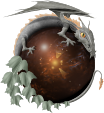- Cities and buildings
- Fields, plains and deserts
- Forests
- Hills and mountains
- Islands and promontories
- Lands, realms and regions
- Rivers and lakes
- Seas and oceans


|
|
ContentsAlphabetical indexBrowse topicsReferenceOther editionsTolkien news and resourcesSponsors and associates |
Lexicon of NamesCommon name elements in Tolkien's worksThis lexicon lists some of the more common elements found in the names of places and people in Tolkien's work. These are mainly derived from Elvish tongues, but some common forms from other languages, such as Old English or Adûnaic, are also included, as well as a few less recognisable words that are still found in modern English. There are very large number of these name elements, and this page is being expanded to include more over time. Where possible, the particular Elvish source language for an element is shown, but sometimes this is not possible (for example, where a common root word occurs in more than one language). In cases like this, terms are simply labelled 'Elvish root'.
Choose a page: U
ú
(Quenya) a negative prefix, equivalent to modifiers like 'un-' or 'non-' or '-less' in English. Ancalimë of Númenor used this negative construction when asked who she would marry, giving the name Úner ('Noman'), and it is also used in Borondir's title Udalraph ('Stirrupless'). While the Elves who travelled to Aman were collectively known collectively as the Amanyar, those who did not had a negative version of the name, Úmanyar ('those not of Aman'). In some contexts, the ú- prefix could convey evil or misfortune, as in Úmarth ('Ill-fate') and probably also in Úlairi (the Elvish name for the Nazgûl, with a meaning that is not completely clear, but seems to include the negative ú-). Similarly, while the servants and helpers of the Valar were known as Maiar, those spirits or demons who fulfilled a similar role for the Dark Lord Melkor were known as Úmaiar.
ui 1
(Elvish root) refers to plants with long and trailing leaves, and especially to seaweed. This element is seen in the name of the Maia Uinen ('water-weed'), probably derived from the legend that her hair spread throughout all the waters of the world. Related are two derivative forms, Uinendili ('devotees of Uinen') and Tol Uinen (the 'isle of Uinen' in the bay of Rómenna).
ui 2
(Sindarin) 'forever', 'everlasting', the Sindarin equivalent of Quenya oio-, usually simply translated by the prefix 'ever-'. Seen in the mountain name Amon Uilos, where Uilos means 'Ever-snow-white' (Quenya Oiolossë). The name uilos was also used of a white flower, named Evermind in English (the Elvish meaning is probably 'ever-white'). Note that other Elvish words beginning with ui- (such as Uinen or uial) have alternative derivations, and are not connected with this meaning of ui-.
uial
(Sindarin) 'twilight', referring to either dawn or dusk, which were individually known as minuial ('first twilight') and aduial ('second twilight'). As a place-name element, this was perhaps most strongly associated with the region around Nenuial (literally 'twilight water' but translated 'Lake Evendim') and its surrounding hills of Emyn Uial ('twilight hills' or 'Hills of Evendim'). Uial is also seen in Aelin-uial ('Meres of Twilight'), the region of fenland formed by the River Sirion to the southwest of Doriath.
ul 1
(Elvish root) a derivative of úlgu, 'monstrous, hideous, horrible'. It was used by the Elves in the names they gave to the treacherous Easterlings who pretended alliance to Maedhros, but turned on the Elves in the Nirnaeth Aroediad: Uldor, Ulfang, Ulfast and Ulwarth. Beyond the Ul- element, we do not have reliable interpretations of all these names, but Ulfang seems to mean 'hideous beard(ed one)' and Ulwarth is apparently 'hideous betrayer'. Rather more doubtfully Uldor (who led these people in the battle) perhaps has a name meaning 'hideous king'. The same element possibly also appears in Ulrad, the name of one of the outlaw Gaurwaith. A final example of the same pattern would be Ulbar, a mariner of Númenor, but his name more likely derives from Adûnaic than Elvish, and probably has its own distinct (unknown) meaning.
ul 2
(Khuzdul) 'of', as for example in the Dwarvish name of the valley of Azanulbizar ('streams of shadow'). It could also be used as a genitive ending, and as such it occurs in the name of the language Khuzdul itself, which translates as '(language) of the Dwarves'. Further, ul was also used to form patronymics, so for example the runes on the tomb of Balin in Moria named him Balin Fundinul, or 'Balin son of Fundin'.
ungol
(Sindarin) 'spider'. In place-names this was usually a reference to the monstrous spider Shelob, hence the pass where she lurked in the heights of Ephel Dúath was Cirith Ungol, 'cleft of the spider'. Similarly, her lair was Torech Ungol, translated 'Shelob's Lair', but literally 'lair of the spider'. Related is the name Ungoliant for the even more monstrous spider of the Elder Days (who was in fact Shelob's mother), though here the etymology is complicated by the fact that it evolved over time in Tolkien's imagination. Ungoliant's name originally derived from a variation on ungwë liantë, 'gloomweaver', where ungwë meant 'gloom', so the later word ungol for 'spider' came from Ungoliant's name, rather than the other way around.
uruk
(Black Speech) 'Orc', 'Goblin', one of a range of related terms in different languages which seem to have evolved ultimately from the Elvish stem órok-. The powerful soldier-Orcs of the later Third Age were known simply as Uruk-hai ('Orc-people'), semi-anglicised using the English plural suffix as Uruks, of which the literal translation is simply 'Orcs'.
For acknowledgements and references, see the Disclaimer & Bibliography page. Original content © copyright Mark Fisher 2010, 2020-2023. All rights reserved. For conditions of reuse, see the Site FAQ. Website services kindly sponsored by Discus from Axiom Software Ltd.A DISC Job Match from Discus can assess a personality against the ideal needs of any role. |
